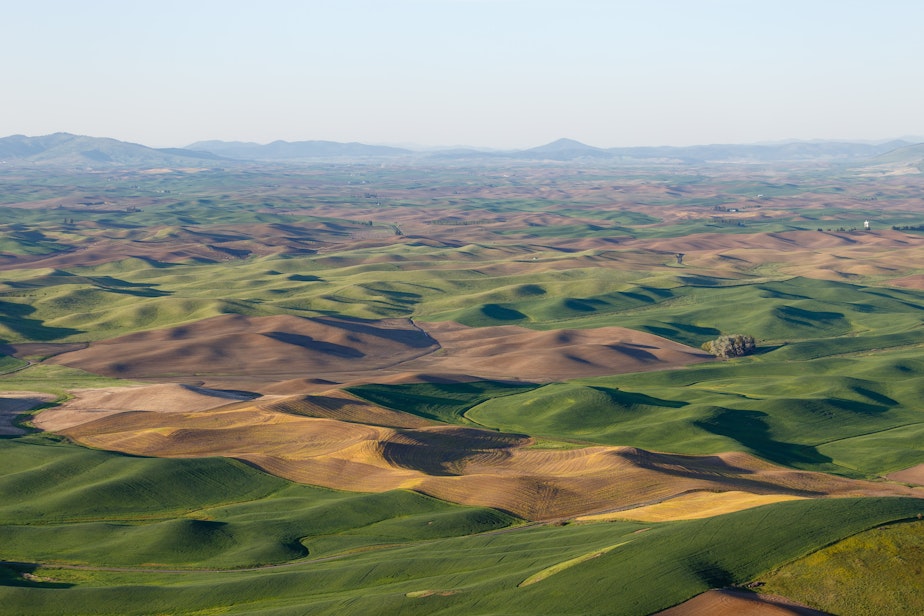'Nature is speaking': How the Palouse inspired a unique soundscape composition

Yii Kah Hoe, a Malaysian composer, soundscape artist, and current Fulbright Scholar in Residence at Washington State University incorporated the sounds of the Palouse into his latest composition, "Of This Land."
Do you ever wonder what snow sounds like? Not just the stillness of empty roads, but the physical phenomena of snow hitting the ground?
You probably can’t hear that and most people have probably never thought of trying. Most people aren’t Yii Kah Hoe, who succeeded in recording that noise using specialized, waterproof microphones.
"Microphones that will be pick up many details and information of the snow dropping sounds," Yii said. He describes the sound as being almost like white noise.
Yii Kah Hoe is a Malaysian composer and Fulbright Scholar in Residence at Washington State University. When he moved to Pullman this August, snow was totally new to him.
He regularly makes field recordings of his surroundings, so recording that snow was a must.
Sponsored
He has a YouTube channel with field recordings from all over the Palouse, like the sound of melting snow at Elk River, or contact mics on creaking tree, or "Persona," a sound sculpture on the campus of WSU.
These recordings became the groundwork for his latest composition, "Of This Land."
For the piece, Yii wove the field recordings with English Horn and a baritone singer.
He said he chose the English horn for two reasons. First: It was similar to the sound sculpture.
"I like the sound quality of the English horn, and also because the melody and the motif of the music that I composed is inspired by the sound sculptures that I heard," said Yii, who wrote the English horn to work in tandem with the sculpture recording.
Sponsored
The other reason he chose the English horn is because it has special meaning for him. His friend, Keri McCarthy, is an oboe professor at WSU and a longtime collaborator with Yii. McCarthy is also the director of the School of Music at WSU. McCarthy describes Yii's work as very active in rhythm and pitch.
"There are a lot of notes that get in between the bigger notes, for example, lots of ornamentation, lots of reflection of traditional musics from Asia; this piece was really different," McCarthy said.
McCarthy added that one notable aspect of the piece is the way the baritone voice and the English horn interact.
"Sort of in a more reflective, conversational element than would be common and I just loved it," McCarthy said.
"Of This Land" incorporates many of Yii’s big ideas about space and sound. The piece was performed in the Elson S. Floyd cultural center, a round building with multiple levels. McCarthy played the English horn on one level. Baritone singer Aaron Agulay stood on another.
Sponsored
Audience members were the performers in the final section of the piece. They played Yii’s field recordings on their phones and as they moved around the space, a microphone captured the recordings and projected them back at the audience.
McCarthy said the mix of field recordings gave the piece a sense of place, a grounding in the Inland Northwest, and a connection to the world outside the performance.
"He captured all of these different sounds from 15 or 20 different places across the Palouse, creating this piece that allows for the listener to really engage with their own lived environment in a way that is intentional and focused for 20 minutes at a time," McCarthy explained. "And then to hear this beautiful baritone voice and English horn playing come out of that."
Yii uses his field recordings and composition to raise awareness about environmental degradation.
When he travels, he notices changes in soundscapes. On the island of Borneo, where he is from, the only noticeable change in seasons is the amount of rain.
Sponsored
"The soundscape of Borneo’s rainforest has more biodiversity if compared to the sounds of Pullman and Idaho," Yii said. "That doesn't mean the sounds for Pullman and Idaho are less interesting. In fact, I had a great time listening to the soundscape as the seasons change from the fall to the winter."
To Yii, field recording isn’t just capturing the sound of snow falling — it’s a way of giving the natural world a voice and a chance to advocate for itself. What it is saying is up for the audience to decide.
"I just want to emphasize that the nature is speaking and there must be some message behind [it]. We humans need to listen carefully," he said.





